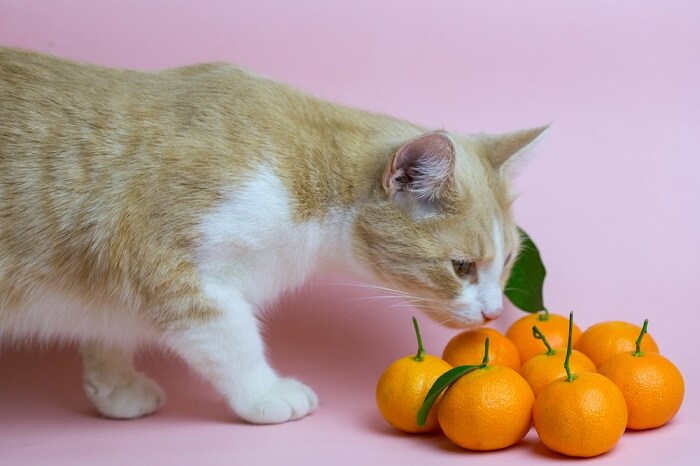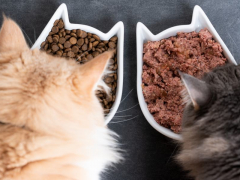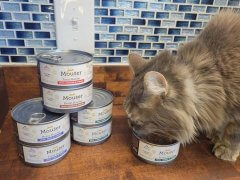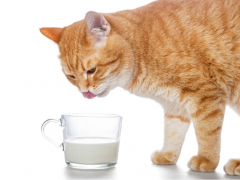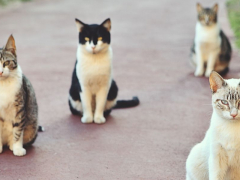Oranges are a healthy part of a human’s diet, but if your cat is interested in this juicy fruit, can you share it with your feline friend?
Cats are carnivores: their diet mainly consists of meat. Many essential nutrients cats require are found only in meat and meat products. Cats have quite specific needs from their food, and so the safest option to feed your pet feline is a commercial diet designed specifically for cats.
While not toxic to cats, oranges are not a recommended food for them as they can cause digestive issues and are not a part of their natural diet.Quick Overview: Can Cats Eat Oranges?
Toxic: Yes
Commonly Allergenic: No
Species Appropriate: No
How Often to Feed: Never
How Much to Feed: None
Summary of Content
However, as hunters of small prey, cats enjoy variety in their diet. Many cats will enjoy a small tidbit of human food, and there are a variety of things that they can safely be given as an occasional extra.
Citrus fruits, such as oranges and grapefruit, though, are not recommended as they contain oils that can be toxic to cats. Read on to find out more.
Are Oranges Good for Cats?
There are no known benefits of oranges for cats. The feline species, in general, cannot digest fruit and vegetables well, and the oils contained in the skin of citrus fruit can even be harmful. Some cats need a diet high in fiber, but an alternative source is recommended.
Also Read: 15 Human Foods That Are Poisonous & Toxic To Cats
Do Cats Like the Taste of Oranges?
Cats are usually strongly repelled by oranges and other citrus fruits. This is thought to be due to their very strong smell. Cats have very sensitive noses and seem to find the citrus scent overwhelming. Orange peel is actually used in various cat repelling sprays.
How Much of an Orange Can a Cat Eat?
Cats shouldn’t eat oranges or nibble on the peels, seeds or leaves since they contain oils that may be harmful.
It is rare for cats to like the smell or taste of oranges. In fact, orange scents are used as a repellent for cats! It is difficult to say exactly how much orange a cat could eat without it causing harm.
A small amount of the fleshy fruit is unlikely to cause severe symptoms, but the citric acid can cause vomiting and diarrhea. The peel, seeds, and leaves can all cause problems even in small quantities.
How Often Can a Cat Eat Oranges?
It is not recommended for cats to eat oranges at all due to the potential to cause them to become unwell. Most cats hate the smell of orange (and all things citrusy), so if they do taste one once they are unlikely to repeat the experience.
Are Oranges Used in Commercial Cat Food?
Cats are carnivores and thrive on a meat-based diet. They have no physiological need to eat plant material.
Commercial cat foods are therefore mostly made up of meat and meat derivatives, which will be bulked out by various fillers. Oranges are not used in commercial cat food, and it would not be considered safe to do so.
Are Oranges Bad for Cats?
Oranges can be toxic to cats and can cause them to become quite unwell. Some cats can tolerate small amounts of citrus fruit, but even small amounts can cause problems in some cats. The flesh is generally less of a problem than the peel and seeds.
The degree of harm usually depends on the amount of orange eaten, the weight of the cat, and any pre-existing health concerns. Some cats also just seem to be more prone to reacting badly to oranges than others.
A cat’s digestive system is unable to be process the citrus oils found in these fruits, which may cause disturbance to the intestines. This usually results in vomiting and diarrhea. Large quantities can also damage a cat’s nervous system, resulting in weakness and sensitivity to light.
Oranges also contain high levels of vitamin C, a good thing for humans. However, cats produce their own vitamin C, and if they ingest more, they will need to excrete it. The vitamin C is flushed out of the body as a compound called oxalate, which can combine with calcium to form calcium oxalate stones in the urine, causing bladder and urinary problems.
Also Read: Bladder Stones In Cats: Causes, Symptoms & Treatment
Occasionally the peel of citrus fruits such as oranges can cause an allergic skin reaction in cats who come into contact with it.
Frequently Asked Questions
Is orange juice safe for cats to eat?
No, it is not recommended for cats to drink orange juice as the citrus oils can cause digestive upsets and even be toxic to cats.
What happens if my cat eats oranges?
Some cats will remain unaffected if they eat an orange, especially if they only eat a small amount of the flesh. However, some cats will rapidly show vomiting, diarrhea, weakness, and lethargy.
Do oranges hurt cats?
Yes, oranges can be toxic to cats, especially the peel and seeds.
What fruits can cats eat?
Cats have no physiological need to eat fruit. However, if you really wish to give them some, a small amount of peeled apple, banana, or strawberry is safe to give them. Grapes and all citrus fruits should be avoided.

